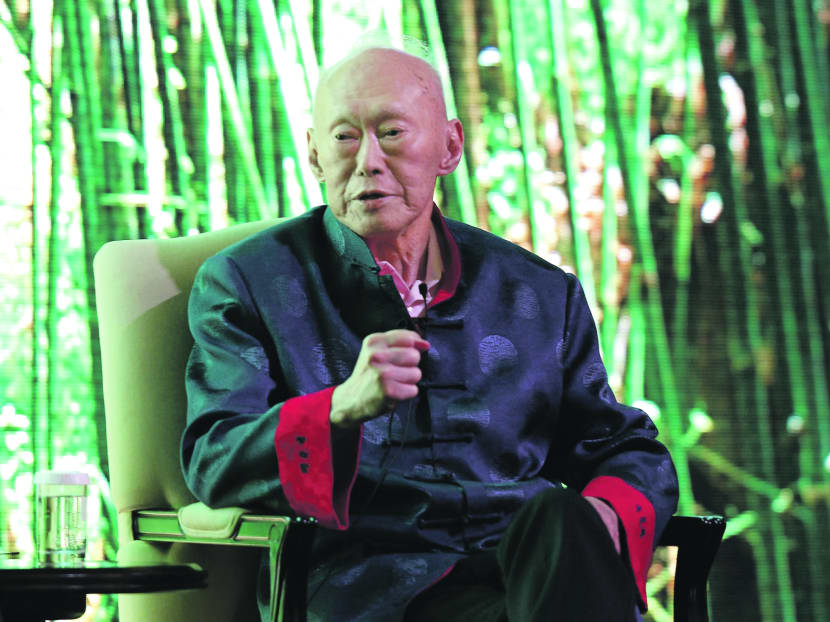Keep S’pore’s doors open to quality immigrants: LKY
SINGAPORE — Noting the demographic challenges faced by China and Japan, former Minister Mentor Lee Kuan Yew yesterday reiterated the need to keep the Republic’s doors open to “quality” immigrants.

Mr Lee expressed confidence in the Republic’s ability to stay ahead of emerging economies in South-east Asia ‘for the next 20 years’. Photo: Ernest Chua
SINGAPORE — Noting the demographic challenges faced by China and Japan, former Minister Mentor Lee Kuan Yew yesterday reiterated the need to keep the Republic’s doors open to “quality” immigrants.
Besides helping make up the numbers amid the low birth rates, Singapore’s approach of exercising “quality control” among immigrants — resulting in an enlarged talent pool —would also ensure it stays ahead of emerging economies in South-east Asia, Mr Lee said. In comparison, Japan would become “a nation reduced to nothingness”, as Mr Lee put it, if it continued to be averse to immigration.
He said: “I see a nation reduced to half in 20 years, and if it still continues with the same policy, reduced to a further half, and eventually, it is all over.”
Mr Lee added: “To have a nation, you must have people and you must have young people to be able to drive the economy and young people buy the products ... and if you don’t have that, and you refuse migrants, as the Japanese do, you will just dissolve into nothingness. I think before that comes, they may change (their) policy,” he said.
Speaking at Standard Chartered’s Singapore Forum Fireside Chat yesterday, Mr Lee was responding to a question about how concerned countries like Japan should be about an ageing population.
China, too, is “risking its future” if it carries on with its one-child policy, he said. “Property prices will go down, assets will go down. There is no younger generation to put the pressure up, so I think it is heading towards the wrong direction,” said Mr Lee.
Apart from Mr Lee, the dialogue included former United States Federal Reserve Chairman Paul Volcker and StanChart Group Chief Executive Peter Sands. Mr Volcker noted that the world “cannot continue to grow” indefinitely, and would have to resign to “being like Japan” eventually.
When asked about Singapore’s success and whether it can continue to thrive, Mr Lee said that for the Republic to remain successful, it needs to “retain the confidence” of investors and the people in the Government’s policies and institutions.
“It will be very stupid of us to shake that confidence. The confidence rests on several pillars: Institutions, sound policies by the Government and an open trading area,” said Mr Lee.
Singapore has had the chance to build up its institutions and rule of law, which requires “stable governments” that do not change policies when the next ruler shows up, he added.
Saying he was not worried about emerging economies in South-east Asia surpassing Singapore, Mr Lee said he was confident the Republic would stay ahead “for the next 20 years”. Reiterating Singapore’s advantage of having “quality” immigrants, he said: “They will make progress, but if you look at the per capita they have got, the differences are so wide. We have the advantage of quality control of the people who come in ... so the increase in population means an increase in talent.”
In particular, Singapore will continue to be strong in the financial sector, Mr Lee said, as there was “no real alternative”. “(Other countries) do not have the institutions, the confidence or the people with the money,” he said.
On a broader front, Mr Lee said he would not take continued growth in Asia for granted, a sentiment shared by Mr Volcker. He also noted how some countries in the region did not work by the rule of law but by an individual. “When the individual changes, the system changes,” he said.
Eugene Neubronner









